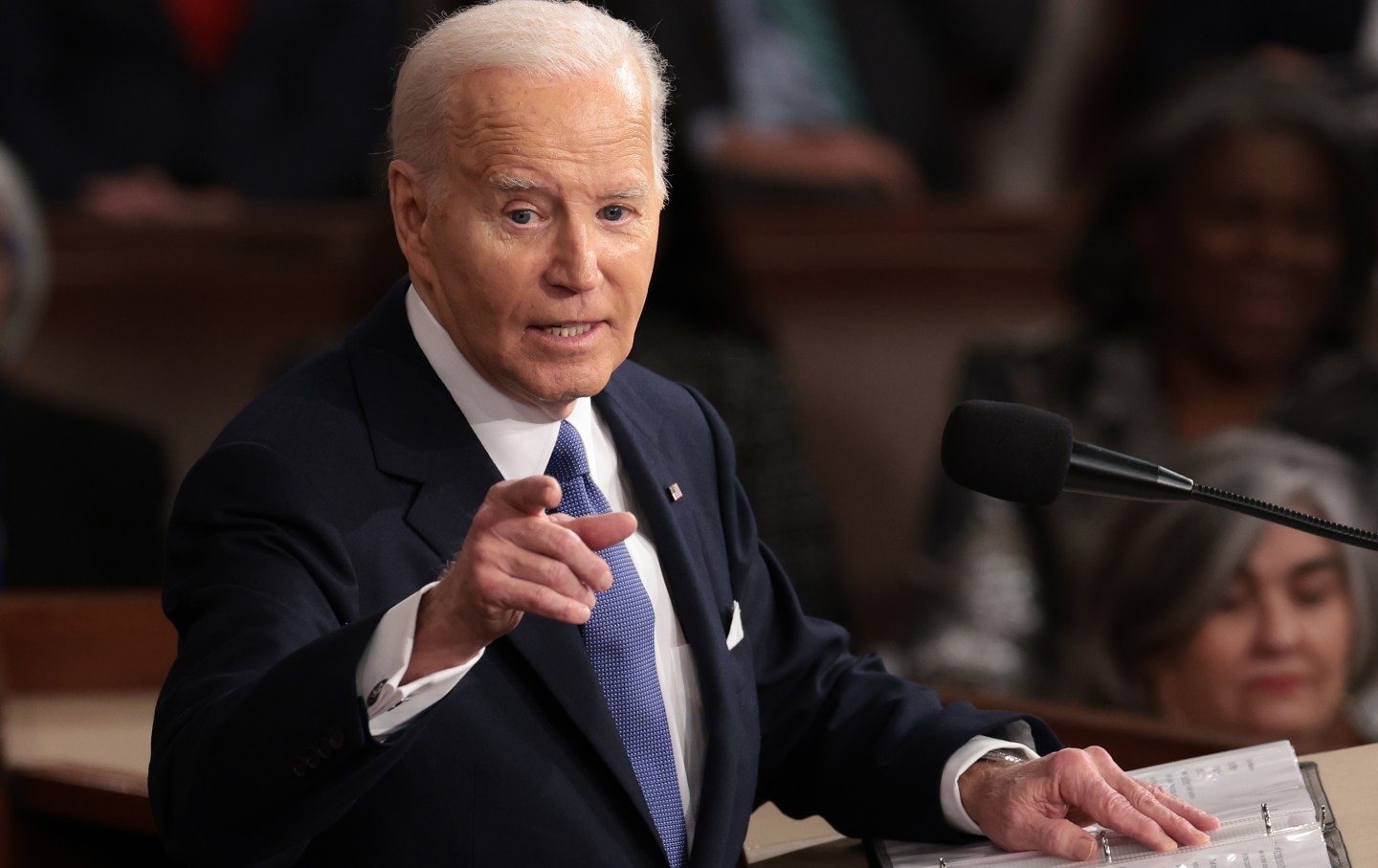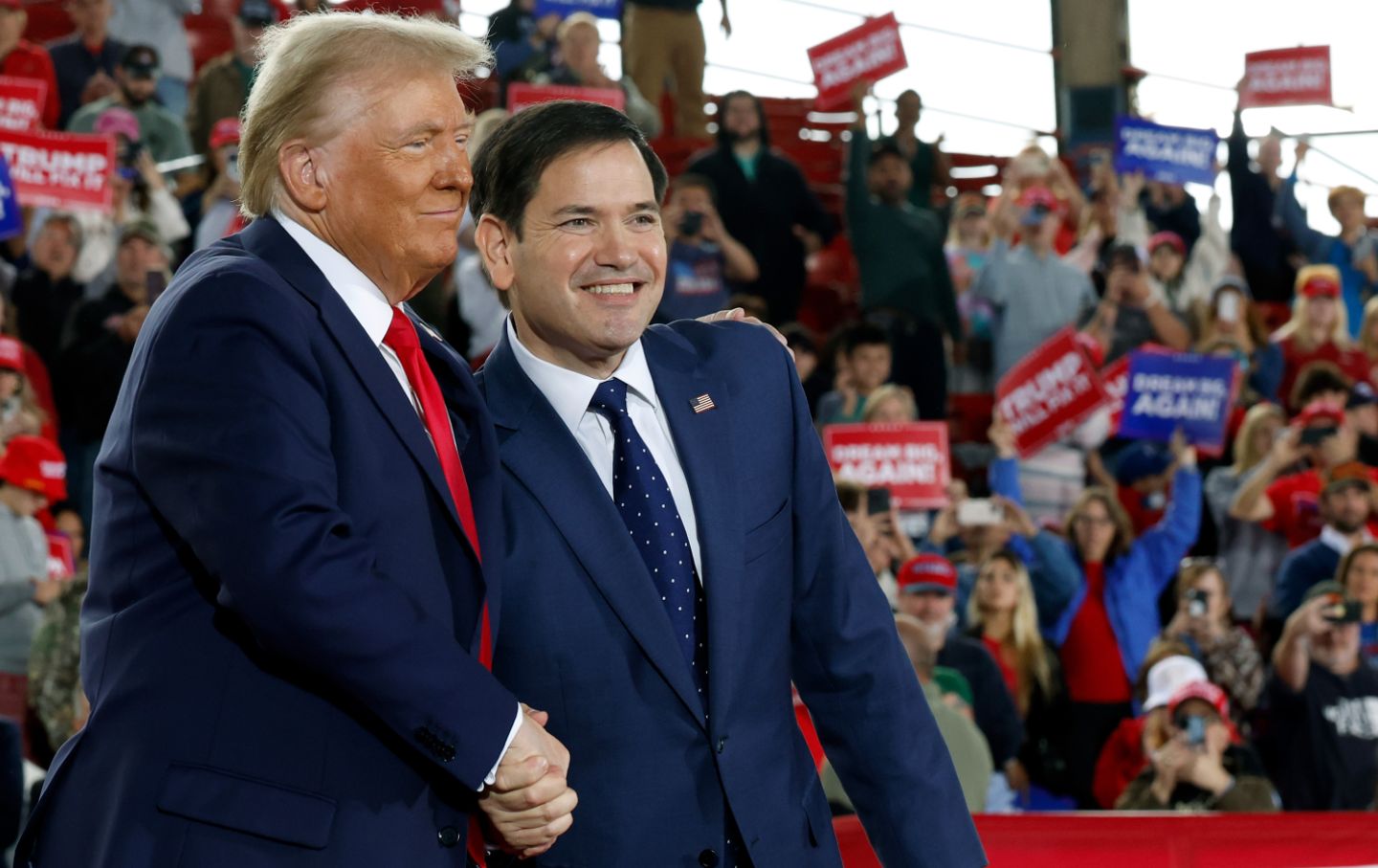Let the Presidential Election Mudslinging Begin!
Trashing Donald Trump can’t be Joe Biden’s whole reelection message. But it’s a good start.

Presidential elections used to be derided as popularity contests. In the 21st century, they have become something much worse: unpopularity contests. The key to winning presidential races is no longer being the most liked but rather the least hated. The last real popularity contest in national politics was in 2008 when John McCain, a war hero who had genuine bipartisan admiration, was matched against Barack Obama, the most charismatic politician in a generation, so newly minted the GOP was just figuring out how to attack. In that election, McCain and Obama treated each other with respect, notably when McCain rejected attempts by his supporters to label Obama a covert Arab or secret Muslim.
The trash talk in that campaign was confined to McCain’s vice presidential running mate, Sarah Palin, who was not shy about embracing conspiracy theories by suggesting Obama was guilty of “palling around with terrorists.” At the time, Palin was often portrayed as an embarrassing outlier, a rogue running mate at odds with the campaign. But in truth Palin was a precursor of the mudslinging that would soon become the norm in American politics. In 2011, Donald Trump became a GOP star by embracing the xenophobic birther lie that Obama was not born in the United States. Tellingly, Mitt Romney welcomed Trump’s support in 2012. Obama countered with perhaps the most devastatingly negative ads in American history, which—accurately—detailed Romney’s history of corporate predation.
Trump has dominated the GOP since 2016 and is now on track to be the party’s nominee for a third time in a row. The Trump era has seen calumny rule the roost. Trump, of course, is a specialist in sliming his opponents with lies and insults, ranging from “Crooked Hillary” to “Sleepy Joe.” There was no reason to treat Trump with respect, and Democrats rightly responded to his defamation with accurate listings of his many personal flaws, including (a brief list) his sexual assaults, his lies, his criminality, his bigotry, and his dictatorial aspirations.
As with the last three elections, 2024 is shaping up to be an unpopularity contest, where the way to win is to create a coalition of the unwilling motivated by fear and hatred of your opponent. The problem Joe Biden faces is that he’s made himself even less popular than his rival. As Nate Cohen of The New York Times notes, “Biden is very unpopular. He’s so unpopular that he’s now even less popular than Mr. Trump, who remains every bit as unpopular as he was four years ago.” According to a The New York Times/Siena College poll, Biden’s favorability is 38 percent as against 59 disapproval (a net 21 percent disapproval). Trump’s numbers are 44 percent approval and 54 percent disapproval (a net 10 percent disapproval). Contra Cohen, this means that Trump is actually more popular now than he was during his presidency, when his numbers were frequently in the same negative-20 rage as Biden’s.
How did Biden get to be twice as unpopular as Trump? Writing in The Nation, Josh Cohen persuasively points to Trump as a beneficiary of lower scrutiny because his comments nowadays appear on more opaque social media (the little-read Truth Social is now Trump’s habitat, not Twitter, itself less prominent and rebranded as X). Trump has also talked less about his policies, which are wildly unpopular.
Analysis suggests that the first order of business for Biden is to return Trump to his former status as the most unpopular figure in American politics. In other words: Let the mudslinging begin.
Biden and those around him seem to have drawn this obvious lesson. A recent New Yorker report on the Biden White House quoted Senator Sheldon Whitehouse of Rhode Island. Like many, Whitehouse is supporting Biden more out of resignation than enthusiasm. Whitehouse told The New Yorker that while Biden was “not the only option that we had…once he’d made the decision to go, he became the only option that we have.” Given this reality, Whitehouse advocates a “Biden plus offense” based on the fact that when people are “frightened or angry, you need to convince them that you, too, are equally concerned and you’re willing to throw punches and pick fights. Whitehouse added, “If you’ve got your sleeves rolled up and you’re waist-deep fighting alligators in the swamp, then nobody’s really thinking about your age.”
During his State of the Union address on Thursday, Biden seemed to have accepted the need to fight the alligator—or at least throw some dirt balls at Trump. Aside from touting his achievements and future goals, Biden used his speech to Congress to remind voters of why they hated Trump so much when he was around. There’s much to work with, since voters haven’t really been connecting the dots between the policies they dislike and Trump himself. According to a Data for Progress poll, “When voters are asked whom they hold responsible for new bans or restrictions, about half of voters attribute responsibility to the Supreme Court, while one-third attribute blame to Republicans in Congress (34%) and Republicans in state office (33%), and only 24% blame Trump.”
Democrats should look at that 24 percent and see it as a challenge. It is actually the case that Trump, who nominated three of the judges who voted to overturn the constitutional right to an abortion, is more responsible for the abortion rollback than any other single figure. In the speech on Thursday, Biden took some clear hits at Trump, although he refrained from speaking his predecessor’s name. These hits were designed to remind Americans of why so many of them hated Trump. On abortion, Biden said, “Clearly those bragging about overturning Roe v. Wade have no clue about the power of women in America.”
About authoritarianism, Biden said, “My lifetime has taught me to embrace freedom and democracy. A future based on the core values that have defined America: honesty, decency, dignity, equality. To respect everyone. To give everyone a fair shot. To give hate no safe harbor. Now some other people my age see a different story: an American story of resentment, revenge, and retribution.” This was also a veiled but unmistakable attempt to draw a contrast with Trump, and Biden’s frequent allusions to his “predecessor” make clear that this speech was just an opening salvo in the coming electoral battle.
In the days and weeks to come, Biden will be able to shed the decorum of the State of the Union address and name Trump. Biden and his allies have ample material to emphasize not just Trump’s character flaws but also his political extremism.
This mudslinging is necessary and salutary—but it’s only a start. Biden is behind in most of the polls and needs to even the playing field. But to truly win, he’ll also have to rebuild the winning coalition of 2020. As the strong showing of “uncommitted” in Democratic primaries proves, this coalition is fraying, thanks to unpopular policies such as Biden’s nearly unqualified support of the Israeli assault on Gaza.
The long list of promises in the State of the Union address will make a difference only if voters are convinced that they will be carried out. On Gaza, Biden’s decision to build a pier to facilitate humanitarian aid seems, alas, like a cheap gimmick, a sop to his critics. The starvation in Gaza is a product of the Israeli siege, which Biden continues to support. So with one hand Biden is building a pier to break the siege that with another hand he is helping to maintain. This is an incoherent policy. Biden’s reelection depends on two-pronged strategy. The mudslinging is a good start, but he’ll need to emphasize a more positive agenda, including an end to the ongoing slaughter in Gaza, if he wants to seal the deal.
More from
Jeet Heer 

No, Kamala Harris Staffers Did Not Run a “Flawless” Campaign No, Kamala Harris Staffers Did Not Run a “Flawless” Campaign
Democratic strategists are still patting themselves on the back for a catastrophic defeat.

Donald Trump’s Government of Gangsters Donald Trump’s Government of Gangsters
Who is being naïve now?

The Democrats Will Keep Losing Until They Solve Their Plutocracy Problem The Democrats Will Keep Losing Until They Solve Their Plutocracy Problem
The party’s habitual deference to big donors makes it impossible to effectively oppose Trumpism.

Only a Working-Class Party Can Challenge Donald Trump’s Corruption Only a Working-Class Party Can Challenge Donald Trump’s Corruption
GOP plutocracy thrives as long as Democrats remain beholden to Wall Street.

Biden’s Mindless Escalation Is a Final Betrayal of Ukraine Biden’s Mindless Escalation Is a Final Betrayal of Ukraine
Instead of preparing for inevitable negotiations, the outgoing president adds fuel to the fire.

Donald Trump’s Foreign Policy Will Be Chaos First, Not America First Donald Trump’s Foreign Policy Will Be Chaos First, Not America First
His team of cronies includes establishment hawks and cranky outsiders who are more likely to deliver global anarchy than world peace.


